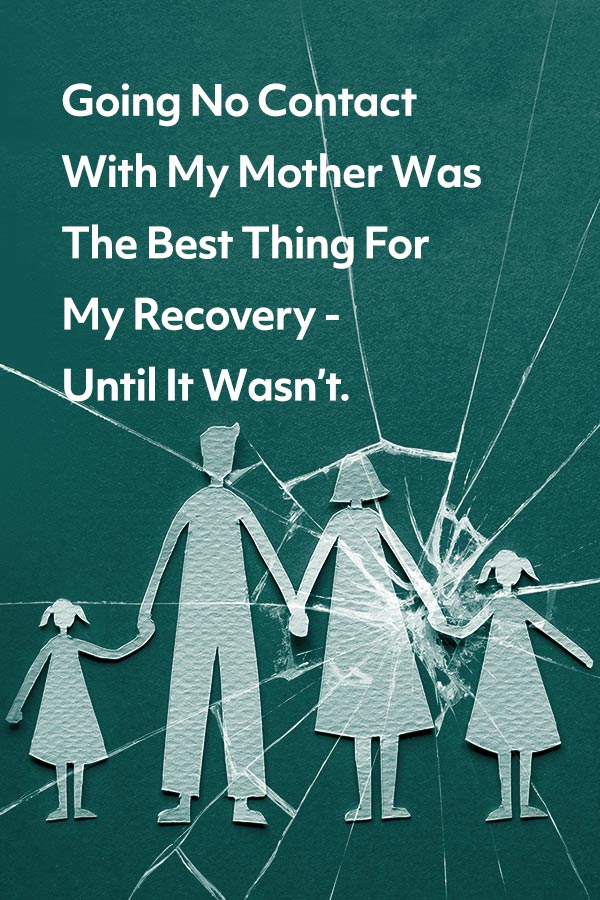Content warning: This piece describes emotional abuse and sexual assault, as experienced by the author.
My recovery began before I put down substances, with therapy, yoga, and inner child work among other modalities. This brought me to a place of harm reduction with my using.
With this relative clarity of thought, I realized that there was no way I was going to dismantle my internal abuser while still talking to my original abuser—the person whose voice I’d internalized to hurt myself.
That person was my mother.
As an adult child of an alcoholic, recognizing the abuse I’d experienced
I became aware of this when an article I’d written was coming out and I wanted to give her a heads up. I wasn’t concerned that she’d click the link if I posted it—neither of my parents could care less about my work—but that one of her friends might see it and report back. Even that was unlikely, but I was terrified then to be this forthcoming with a dark family secret.
The piece I’d written was about my failed marriage. In the course of that reflection, I’d referenced an article I’d written for my college newspaper, titled “Getting Married Young Is Just Plain Stupid.” I’d known more then than I would later—my disease hadn’t had a chance to progress to more destructive levels yet.
The article was not only right about my marriage, it was also right about the marriage of my cousin, who’d been the inspiration for the piece.
How did I know that? Well because my cousin’s husband had taken me out drinking when I moved in with my mom at the end of my marriage. He’d fed me shot after shot of tequila while nursing a beer. I came to in a seedy motel room near our homes—their family was living with my aunt, next door to my mom—with him inside of me.
He told me that if I told anyone he’d have me killed.
My mom and stepdad knew later that he was creeping me out, but that was the extent of it. I was drunk, so I believed it was my fault for years. When I began actively recovering from trauma, I learned that it wasn’t my fault.
When my mom picked up the phone she was already in a mood.
“What do you want?” She growled. “I’m at work.”
I started the way I always had when I had to tell her something real: with a lie. I told her what a good mother she was and how grateful I was to be her kid. Then I told her about the article.
“You already told me that,” she said. I felt the familiar hole in my stomach at the gaslight.
“No, I’m sure I didn’t,” I replied.
“Well,” she continued, “You told me that he hit on you, and that’s the same thing. AND I’M AT WORK.”
“If you’re busy don’t pick up then!” I shouted through tears at a phone call that I’d already ended.
When you don’t believe yourself worthy of boundaries, it’s easy to externalize blame. I wouldn’t unpack that legacy with compassion for a while yet, and wouldn’t have been able to at all if not for what I did next.
I went no contact with my mother.
Breaking free and finally finding motherly love
People with less toxic mothers always ask me how I managed to go five entire years without speaking to mine. “It was easy,” I laugh. “I just stopped calling her.”
Once I was no longer racking up new trauma events, I was free to get into the business of healing. I became my own mother, learning how to be gentle with myself in all the ways she couldn’t, love myself in all the ways she wasn’t able.
I found women to look up to—12 step sponsors, women further along in their writing or comedy careers than me, healers, therapists. I slowly became so close with an aunt—my mother’s sister whom my mother doesn’t talk to for something that wasn’t even her fault—that sometimes when she’s asked how many daughters she has she forgets and includes me.
From them and from my favorite mother figures, the authors of books, I learned new behaviors, new ways of self-perception. I began to see the behaviors and thoughts that did not come from me and did not serve me—how I got so mad at myself when I didn’t immediately master something, how I was so afraid to make mistakes that I didn’t even try.
I saw how I skipped right over my feelings when triggered and focused instead on what I couldn’t control—the other person’s behavior. I didn’t even really know what I was feeling most of the time. It didn’t feel safe to feel. Once I began to own my feelings, I stepped back further to see how my go-to method of bonding was actually triangulation, and how much that was hurting me and my social world. I slowly stopped doing that, and with so much less noise in my head that I needed to quiet, I was able to put down my final substances and get sober.
I started talking to my sister again, the person whom my mother had triangulated me away from and pitted me against my whole life. I understood it now. It was never about us, but about my mother protecting her drinking and feeling important and loved by staying in the middle. As the trust built between the two of us, I was able to start being the aunt I’d always wanted to be to my three nieces.
I stayed sober and worked on myself and didn’t regret what I’d done.
Through my relationship with my aunt, whom I talk to every week, I was able to share in a deep mutual regard and unconditional love. Through that, I’ve learned how to have healthy disagreements and different opinions—we’re on different ends of the political spectrum—and that it didn’t mean that love was withdrawn or that the relationship was in jeopardy. Just this morning she said, “You know, I don’t think your mother knows that’s an option or has ever experienced it herself.”
For years I didn’t even know my own opinions on things. I would agree with whatever you said so that you wouldn’t abandon me. Imagine the joy of being in your thirties and just figuring out where you stand on things. I’d long envied the ‘hot takes’ other comedians would profess on current events. I was too scared to even think of what my take on a thing would be. It might mean people would run away from me.
In a space where I wasn’t living in fear of my mother’s reaction, I wrote my book—the one I’d been wanting to write all my life. I know she won’t be happy with how she’s portrayed, but I also now know that everyone is welcome to take their version of events and make it into art, and this is mine.
Deciding when and how to reconnect
My mother is also in 12-step recovery. I only know this because once I saw her name on a phone list when I was visiting. I’ve been asked by others why she hasn’t made amends to them, taking the 9th step.
“Get in line,” I laughed. But later, I thought about how I hadn’t made amends to her either. Even if my part was much smaller, I still had one. Had I not scared her with my cocaine years? Had I not once called her a name when she tried to wake me up out of a hangover? I had, but until that moment I’d focused on her part—that she’d locked me out in the dead of winter because I, at 28 years old, came home ten minutes after ‘curfew.’ That night I slept on a couch on the porch and nearly froze to death before she let me in at 7 am. That’s the part she has to live with. The part where I called her the C-word the next day? That’s all mine.
“I know she won’t be happy with how she’s portrayed, but I also now know that everyone is welcome to take their version of events and make it into art, and this is mine.”
I’d been sober two years at this point. My life was stable, as was my sense of self. I was safe from her in a way I’d never been. I’d grown big enough that she couldn’t hurt me the same way.
I sent cards for Mother’s Day and her birthday and texted from time to time to talk about cats—a safe subject. I’d just gotten one, and she’d always preferred them to people, slapping my hand once when I made a turkey sandwich for work because she’d bought the turkey for the cat. This went so well I ordered another milk and another whiskey (sorry, that’s a 12 step joke!). I didn’t really have milk or whiskey, but I did consider visiting her when I went home next. Maybe even make that amends. It still hurt me to think that it might go the same way the one with my dad had (“Yes, certainly that is a lot of things wrong you did. Here are some other wrong things you did that I’m holding onto even though you were a child. and I definitely am completely perfect and have never done anything wrong.”). So maybe a direct address wasn’t the answer just yet. But like everyone, my mother isn’t forever.
I texted her that I may be available on X dates and could possibly come see her if she wanted. Then I almost canceled when word reached me thirdhand about some high-pressure dinner she was planning for a day I hadn’t even confirmed.
“You have to go,” my sister said. “She bought you a birthday gift.” Of course she had, for the first time since I stopped talking to her, despite having had my address the whole time. I got the message, and even scrolled back through mine to confirm that I’d never made those plans.
I planned to meet her for lunch at a neutral location and brought a friend that’s part of my chosen family.
She was immediately miffed that we wanted to sit outside (during a pandemic) because she’d snagged the last air-conditioned table inside, but I needed a place for the energy to go.
It was anticlimactic. That was my mother. The same as always. She didn’t ask me one question about myself, she didn’t mention that I’d managed to build myself a life worth living or stop killing myself with drugs and alcohol, she just wanted to talk about her cats and her Tesla.
My friend nearly cried recounting the tale later to our mutual friend, “I’ve never seen anyone work on themselves harder than Becca, and her mom couldn’t have cared less! Not one question, not one whisper of ‘I’m proud of you!’”
That’s my mother. And for once, I didn’t have to make the way she is into a story about me. Not only that, it was the first time in my adult life that I saw her without having to drink or use over it.
Gratitude for the love in my life instead of resentment for the love I was denied
After we left the awkward lunch (which I later heard thirdhand that she thought was very nice), my friend and I went to jump off a nearby dock into the Atlantic Ocean, a throwback to her childhood. As we bobbed in the cold, salty water, a fishing boat pulled into dock nearby. The name on the side was Margaret. That’s my 12-step sponsor’s name.
I thought of all the love I did have in my life, all the female nurturing I was able to give and receive. An entire constellation of love, from my yoga teacher to my therapist to the friend alongside me in the Long Island Sound.
If I’d had a mother capable of loving me the way I needed, I might not have gone out and found all of that. I started to feel bad for people with healthy mothers—they’d be devastated when theirs died but me? I know the secret to giving and receiving mother-love exists beyond that one person who birthed you. I have a dozen mothers, and I can play that role when appropriate for those in my life that need it.
Even if I could wave a magic wand and make, say … Anne Lamott my mother, I don’t think I would. I wouldn’t change a single step on the road that brought me here.









